第二十四讲:状态模式
Posted 绿茵好莱坞
tags:
篇首语:本文由小常识网(cha138.com)小编为大家整理,主要介绍了第二十四讲:状态模式相关的知识,希望对你有一定的参考价值。
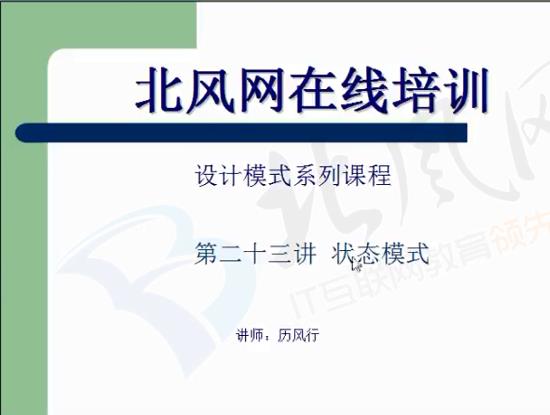
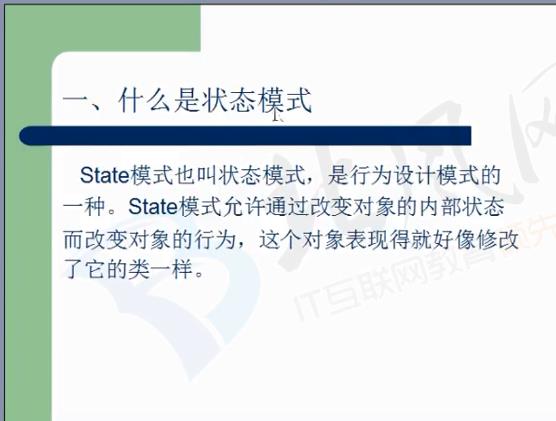
改变对象的内部状态hour,然后判断内部状态而改变对象的行为.但是这样的设计是非常不合理的.
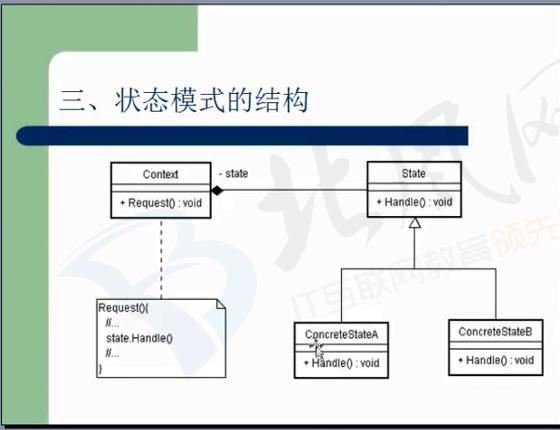
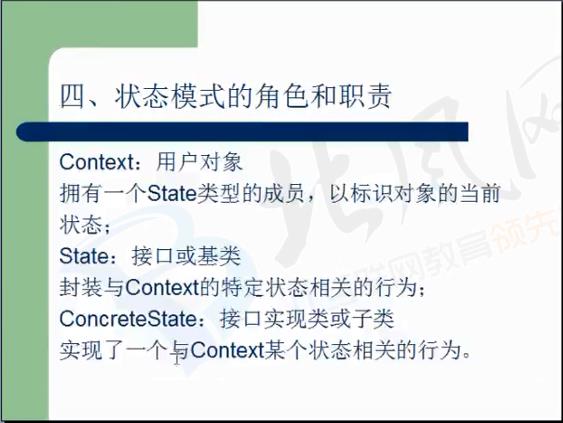
Context:Person.用户对象类.
 黑色菱形后面一条直线表示聚合,Context持有了State的一个引用.
黑色菱形后面一条直线表示聚合,Context持有了State的一个引用.
private State state;//持有了State类的一个引用.
整个判断还是放在了Person里面,
public class MainClass { public static void main(String[] args) { Person person = new Person(); person.setHour(7); person.doSomething(); person.setHour(12); person.doSomething(); person.setHour(18); person.doSomething(); person.setHour(8); person.doSomething(); } }
public class Person { private int hour;//时间 public int getHour() { return hour; } public void setHour(int hour) { this.hour = hour; } public void doSomething(){ if(hour==7){ System.out.println("吃早餐"); }else if(hour==12){ System.out.println("吃中饭"); }else if(hour==18){ System.out.println("吃晚饭"); }else{ System.out.println(hour+"未定义"); } } }
package com.ibeifeng.ex2; public class LState extends State{ @Override public void doSomething() { // TODO Auto-generated method stub System.out.println("吃中饭"); } }
package com.ibeifeng.ex2; public class MState extends State{ @Override public void doSomething() { // TODO Auto-generated method stub System.out.println("吃早餐"); } }
package com.ibeifeng.ex2; public class SState extends State{ @Override public void doSomething() { // TODO Auto-generated method stub System.out.println("吃晚饭"); } }
package com.ibeifeng.ex2; public class NoState extends State{ @Override public void doSomething() { // TODO Auto-generated method stub System.out.println("未定义"); } }
package com.ibeifeng.ex2; public abstract class State { public abstract void doSomething(); }
package com.ibeifeng.ex2; public class Person { private int hour;//时间 private State state; public int getHour() { return hour; } public void setHour(int hour) { this.hour = hour; } public void doSomething(){ if(hour==7){ //System.out.println("吃早餐"); //State state = new MState(); state = new MState(); state.doSomething(); }else if(hour==12){ //System.out.println("吃中饭"); //State state = new LState(); state = new LState(); state.doSomething(); }else if(hour==18){ //System.out.println("吃晚饭"); State state = new SState(); state.doSomething(); }else{ //System.out.println(hour+"未定义"); //State state = new NoState(); state = new NoState(); state.doSomething(); } } }
package com.ibeifeng.ex2; public class MainClass { public static void main(String[] args) { Person person = new Person(); person.setHour(7); person.doSomething(); person.setHour(12); person.doSomething(); person.setHour(18); person.doSomething(); person.setHour(8); person.doSomething(); } }

再重新调用person.setHour(7)这时候State是NoState回不去了,永远都是未定义的.
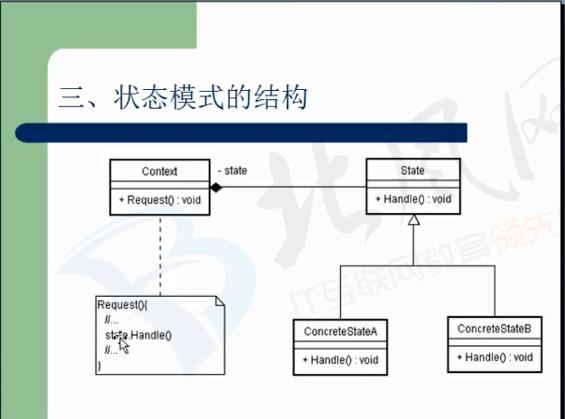
request()相当于doSomething()方法,调用state的doSomething()方法.Person是通过状态Hour来改变行为的.需要根据不同的状态实现不同的行为就使用状态模式.把吃早餐那些代码放到状态类里面去,然后通过持有状态类的引用调用状态类的方法.每一个状态类都有一个状态的转移,因为如果不是这个状态的话就把他转移到下一个状态器.你可以把你的状态一个一个地列出来然后转移.添加一个状态是非常容易的,把这个类实现抽象状态类方法,然后把它列到未定义状态类后面也行.
package com.ibeifeng.ex3; public class LState extends State{ @Override //public void doSomething() { public void doSomething(Person person){ // TODO Auto-generated method stub if(person.getHour()==12){ System.out.println("吃中饭"); }else{ person.setState(new SState()); person.doSomething(); } } }
package com.ibeifeng.ex3; public class MState extends State{ @Override //public void doSomething() { public void doSomething(Person person){ // TODO Auto-generated method stub if(person.getHour()==7){ System.out.println("吃早餐"); }else{ person.setState(new LState()); person.doSomething(); } } }
package com.ibeifeng.ex3; public class SState extends State{ @Override //public void doSomething() { public void doSomething(Person person){ // TODO Auto-generated method stub if(person.getHour() == 18){ System.out.println("吃晚饭"); } else { person.setState(new NoState()); person.doSomething(); } } }
package com.ibeifeng.ex3; public class NoState extends State{ @Override //public void doSomething() { public void doSomething(Person person){ // TODO Auto-generated method stub System.out.println(person.getHour()+"未定义"); } }
package com.ibeifeng.ex3; public abstract class State { //public abstract void doSomething(); public abstract void doSomething(Person person); }
package com.ibeifeng.ex3; public class Person { private int hour;//时间 private State state; public int getHour() { return hour; } public void setHour(int hour) { this.hour = hour; } public State getState() { return state; } public void setState(State state) { this.state = state; } public Person() { super(); this.state = new MState(); } public void doSomething(){ /*if(hour==7){ //System.out.println("吃早餐"); //State state = new MState(); state = new MState(); state.doSomething(); }else if(hour==12){ //System.out.println("吃中饭"); //State state = new LState(); state = new LState(); state.doSomething(); }else if(hour==18){ //System.out.println("吃晚饭"); State state = new SState(); state.doSomething(); }else{ //System.out.println(hour+"未定义"); //State state = new NoState(); state = new NoState(); state.doSomething(); }*/ //this.state = new MState();//每次调用一次doSomething()就重新搜索一遍,因为MState //是开头. //错误,无限循环下去了. state.doSomething(this);//把Person传递进去 //this.state = new MState(); //复位,当所有方法完成以后再执行 state = new MState(); } }
package com.ibeifeng.ex3; public class MainClass { public static void main(String[] args) { Person person = new Person(); person.setHour(7); person.doSomething(); person.setHour(12); person.doSomething(); person.setHour(18); person.doSomething(); person.setHour(8); person.doSomething(); person.setHour(7); person.doSomething(); /* person.setHour(12); person.doSomething();*/ person.setHour(18); person.doSomething(); /* person.setHour(8); person.doSomething();*/ } }
以上是关于第二十四讲:状态模式的主要内容,如果未能解决你的问题,请参考以下文章